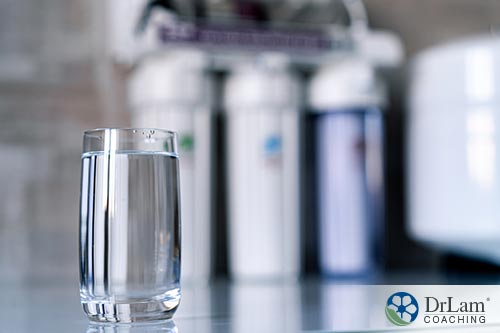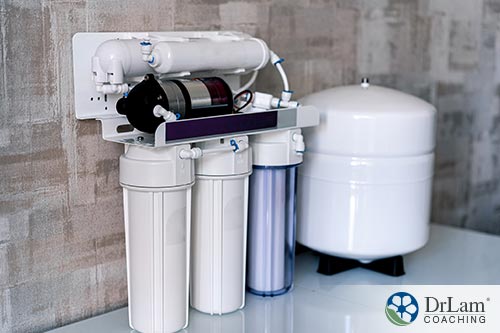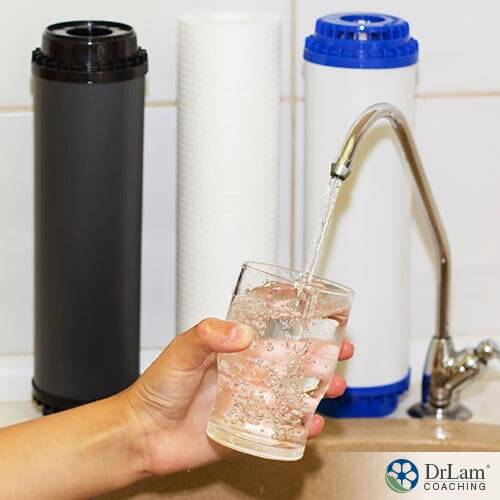 Water is probably the most essential resource in the world. Every living thing on the planet needs water and not drinking enough water can leave you with creeping health problems. Unfortunately, the modern world has impacted even this essential resource. If you drink water from your tap, then you might be getting mouthfuls of toxins that could be endangering your long-term health. You can solve this problem with the right water filters for toxins.
Water is probably the most essential resource in the world. Every living thing on the planet needs water and not drinking enough water can leave you with creeping health problems. Unfortunately, the modern world has impacted even this essential resource. If you drink water from your tap, then you might be getting mouthfuls of toxins that could be endangering your long-term health. You can solve this problem with the right water filters for toxins.
You can’t stop drinking water, so this is clearly a serious health risk that could impact your current and your future health as well as the health of your family. That’s why it's so important to protect your health with a water filter. This is the best way to rid your water of as many toxins as possible so you can feel secure when you take a drink of water again.
At the moment, medical sources claim that men should be drinking around 3.7 liters of water and women around 2.7 liters. This is a lot of water, particularly if it contains toxins. If water that contains toxins is a danger to your health, then the best way to protect your health is by using a water filter.
Water filters for toxins can purify water before you drink it and remove harmful chemicals. However, not every water filter will remove the toxins in your water. And some of them just aren’t worth the money you spend. That’s why you need to do your research and make sure you’re getting a water filter that actually works as advertised. But before you can determine if your water filter is removing the kind of toxins you are facing, you first need to know what kind of toxins might be in your water.
Although the water in most western countries is generally considered to be safe, that doesn’t mean that it’s toxin-free. In fact, the water everywhere is far from perfect. The amount of toxins in your water depends on factors like:
But no matter where you are, water toxins are a clear and present danger to your health and to the health of your family. That’s why you need to consider water filters for toxins.
You might be surprised at the toxins you could find in your tap water. And what’s worse is that new chemicals are invented and set loose in the world every day without much knowledge of their long-term impacts. This is why it’s so important that you learn more about water filters for toxins.
There could be literally hundreds of different toxins in your water, but the most common are:
 As the world’s need for food increases, agricultural practices struggle to keep up. This has resulted in practices that can be very damaging to the environment and to local water sources.
As the world’s need for food increases, agricultural practices struggle to keep up. This has resulted in practices that can be very damaging to the environment and to local water sources.
Fertilizers and pesticides used on crops run off into the soil and into the water systems and can eventually find their way into your tap water. Here are some of the most common fertilizers and pesticides that you need to look out for:
Heavy metal use in the modern world has skyrocketed, and this has led to increasing amounts in drinking water. Unfortunately, heavy metal is extremely toxic. The following heavy metals are often found in water and can have serious consequences for your health:
Modern medicine is a wonderful thing and can have effects that previous generations only dreamed of. Unfortunately, these pharmaceuticals can also make their way into the water system. Animals and humans who take these medications then excrete them and flush them down the toilet. And, in many cases, wastewater plants aren’t equipped to remove them from the water.
Here are some medications that have been found in drinking water:
Chemicals of all kinds can be found in the modern world, from cleaners to beauty products. And most of them end up in the water system sooner or later. Here are some of the chemicals that have been found in tap water:
Your body has the capacity to cope with and expel a certain amount of toxins. This capacity changes from person to person and as your individual condition changes as well.
Tap water usually contains a combination of toxins at different concentrations. The different toxins can all have different effects on your body. And you probably won’t be able to pinpoint the cause of any strange symptoms until the toxic build-up is very severe. It’s this accumulation that’s the real problem when it comes to toxins in your tap water.
When you’re exposed to chemicals constantly in the water you drink, it can start to overload your body’s ability to detoxify itself. Your body may then start to struggle to expel these toxins and so they build up. Over time, this can slowly decrease your overall health until you start experiencing serious symptoms and conditions associated with toxic overload.
It’s obviously best to address this health threat early, before the toxins build up and start causing more serious symptoms or conditions. And you can do that with effective water filters for toxins.
Choosing the right water filters for toxins is pivotal to protecting your health and the health of your family. Here’s what you should do before buying a water filter:

This will help ensure that you get a filter that works to protect your health.
Toxins in your body can be a cause of or exacerbate adrenal fatigue, a condition caused by long-term stress. Short-term stress is a natural state that your body can cope with. It does this by activating the NeuroEndoMetabolic (NEM) stress response. This stress response helps protect you from the damage of stress. It also makes other changes in your body that give you what you need to survive the stress.
These changes usually reverse themselves once the cause of the stress is over and normal functioning can return. But when the cause of stress is long-term and chronic, this reversal doesn’t occur. This leaves the body running in overdrive, with no opportunity for rest, repair, or clearing toxins. It also causes adrenal fatigue, because the adrenal glands produce the cortisol that is the driver of all these changes. Over time, this can lead to Adrenal Fatigue Syndrome (AFS).
Unfortunately, AFS is becoming ever more common in the modern world as stressors become long-term and even lifelong. The resulting imbalances in the body’s circuits can be extremely debilitating and affect the health and functioning of the Detoxification Circuit, which will impact how well your body can filter out the toxins in water.
The Detoxification Circuit consists of three components that together work to rid the body of toxins. These components are the immune system, the liver, and the extracellular matrix (ECM). When this circuit is healthy, it will work in the background to expel toxins, including those taken in through drinking tap water. But when the circuit is unhealthy or already overloaded with toxins, these functions can begin to slow, which can be devastating for your health.
When you have AFS, the three components in this circuit start to malfunction and slow down. This leads to a build-up of toxins in the liver and the ECM, the fluid-filled spaces between the cells, as well as immune system hyperactivity. This then causes more toxic build-up, due to the overproduction of reactive metabolites, inflammation caused by the immune system, and the liver’s inability to keep up with the work of deactivating and expelling the toxins and metabolites.
This is a prime situation for the accumulation of chemicals and other toxins from drinking unfiltered tap water. As the Detoxification Circuit breaks down, the body will struggle to expel the toxins you drink, which could lead to their accumulation and health problems.
Using water filters for toxins will help you to cut down on the amount of toxins you take in when you drink water. This will ease the pressure on the liver and help reduce the amount of toxins that are available to circulate throughout the body, protecting you from the consequences of toxic accumulations. This will also ease the Detoxification Circuit’s workload and encourage it to return to a more natural balance, helping to alleviate your adrenal fatigue and its symptoms.
 It’s an unfortunate side effect of living in the modern world that water filters for toxins should be standard in every home. But if you aren’t using one, then you could be drinking a lot more than you bargained for. This is a serious problem that will likely only get worse as technology advances and chemicals are used with little regard for their long-term effects.
It’s an unfortunate side effect of living in the modern world that water filters for toxins should be standard in every home. But if you aren’t using one, then you could be drinking a lot more than you bargained for. This is a serious problem that will likely only get worse as technology advances and chemicals are used with little regard for their long-term effects.
There’s very little you can do about these trends. But you can act now to protect your health and the health of your family. And you can start by choosing the right water filter for your needs. Here’s how to do that:
The best water filters for toxins will depend on where you live and which toxins are most common in your water supply. You also need to consider how much water you need to filter. However, it's clear is that this is an essential piece of equipment, one that should be standard in every home.